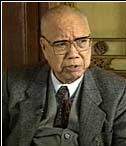Public broadcaster Radio Television Hong Kong will, it seems, remain part of government rather than become an independent entity. At least until next time.
 Within a few years of the handover in 1997, RTHK became the subject of much frothing at the mouth among pro-Beijing patriots like Xu Simin eager to support the new administration (or maybe embarrass it; they had been left out from the post-colonial power structure and were disgruntled). They loudly berated the station for giving airtime to opponents of official policy – not just local policy, like sympathizers of ‘right of abode’ migrants, but big, national Beijing policy, like the Taiwanese speaker who suggested that the renegade province had equal status to the PRC. After the latter episode in 1999, the administration banished fragrant RTHK boss Cheung Man-yee to a trade post in Tokyo, and she was never heard of again. The hate-filled hardliners called for RTHK to become a government mouthpiece.
Within a few years of the handover in 1997, RTHK became the subject of much frothing at the mouth among pro-Beijing patriots like Xu Simin eager to support the new administration (or maybe embarrass it; they had been left out from the post-colonial power structure and were disgruntled). They loudly berated the station for giving airtime to opponents of official policy – not just local policy, like sympathizers of ‘right of abode’ migrants, but big, national Beijing policy, like the Taiwanese speaker who suggested that the renegade province had equal status to the PRC. After the latter episode in 1999, the administration banished fragrant RTHK boss Cheung Man-yee to a trade post in Tokyo, and she was never heard of again. The hate-filled hardliners called for RTHK to become a government mouthpiece. 
Chief Executive Tung Chee-hwa fobbed them off with the sort of nodding and smiling that everyone got from him. Wise heads in officialdom knew that turning RTHK into a propaganda station would decrease rather than bolster the government’s credibility. It would be a gift to detractors, an object of international scorn, and a boost to the city’s fledgling alternative, radical, underground-type media. Unless you go the whole Singapore way, and ban freedom of speech and protest, a public broadcaster without meaningful editorial independence is a laughing stock and a waste of electricity.
The government pushed and prodded RTHK a bit. The station upped its output of inane ads promoting startlingly childlike official campaigns covering dental hygiene to grand-sounding policy announcements; a satirical show critical of politicians came off the air; anti-corruption agents and government auditors took a curiously intense interest in station employees’ expenses and other transgressions; newspapers owned by pro-Beijing tycoons turned up the criticism and the negative coverage.
In 2006, Chief Executive Donald Tsang Yam-kuen appointed a group of sensible, non-troublesome but reasonably decent media types to a commission, which – no doubt under expert guidance from high-flying civil servants – recommended that an independent public broadcaster be established, but that RTHK should not be it.
He opined that public broadcasting could be separate from commercially viable operations, like horse racing coverage or pop music events, and he promised a full public consultation on what to do next. But every possible option for change would have set alarm bells off in his head. Even for a panicky administration that postpones and abandons consultations and initiatives (sales tax, health care financing, political reform, etc), scrapping this project was understandable. It is not every day that Donald says something that everyone agrees with, but he is certainly right when he says that the RTHK issue is “sensitive and complex.”
Commercial free-to-air broadcasting in Hong Kong is controlled by two TV and two radio companies, all of which are owned by pro-Beijing tycoons or mainland-linked companies. As with other cartelized industries, it seems to be government policy to maintain this lack of competition. Their news and current affairs coverage is limited and designed not to offend the local and Chinese governments (re-titling Taiwan’s president ‘leader’, for example). They have no interest in serving as platforms for questioning of policy; they make a point of giving opposition figures little airtime except when they say or do something stupid. So we have a situation where the government’s own station is the only one offering objective news coverage. To tamper with that would not only invite commotion about press freedom but demands to allow a wider range of broadcasters on the air, which would have both commercial and political repercussions. Meanwhile, the venom-spitting patriots have calmed down.
To further complicate things, the RTHK debate is not simply about editorial independence, unbiased coverage or restrictions on commercial and community access to the airwaves. To labour activists and civil servants, it is about an issue that massively overrides such frivolous matters: public-sector workers’ jobs and perks. To Donald – living proof that you can take the boy out of the civil service but not vice-versa – this would be a deciding factor. No consultation; no reform; no corporatisation; no need to deprive any screeching, overpaid, unsackable bureaucrats of their precious iron rice bowls. Peace reigns throughout the land.

